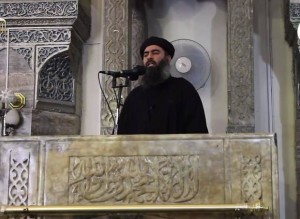
By Iftikhar Hussain
The recent killing of a US journalist James Foley apparently by a British national fighting alongside the militant outfit Islamic State in Syria has raised alarms in many western countries. Writing in the Sunday Times, the UK Foreign Secretary Philip Hammond said, “It is an utter betrayal of our country, our values and everything the British people stand for.” A White House spokeswoman on Tuesday confirmed the death of an American man, Douglas McCain, while fighting for militants in Syria.
The trend of men raised and educated in the West or western converts to Islam joining militant ranks raises serious security concerns for their home countries, analysts say. The Center for New American Progress in a recent policy brief, titled “Bringing the Fight Back Home,” argued that the changing dynamics on the ground in Iraq are accelerating the urgency of the threat from the approximately 3,000 foreign fighters with Western passports, including over 100 Americans. These individuals, many of whom are young, self-radicalized fighters from Western Europe, are fighting with ISIS, al-Nusra and other Sunni extremist groups in Syria and Iraq. Even before the United States initiated military action in Iraq in mid-August, this threat was growing.
The brutal killing of James Foley in a video reflects on the rising number of foreigners fighting in Syria and Iraq alongside the militant outfits. Counter-terrorism experts believe the hard part is when they come back to the host nations. A jihadist living in a developed society is considered an even bigger problem because the foreign fighters include university graduates and soccer players, who aspired for a bright future but ended up in Jihad.
Experts on the topic while talking to VOA Deewa Radio think the reasons of foreign fighters’ participation in Jihad are different and so are the solutions. Muslim community leaders say fears of the western societies apart it was a moment of introspection for all of them because it involved the future of their future generations who were in some way role models for those living in improvised nations back home.
Robin Simcox is a counter-terrorism expert with the London-based Hennery Jackson Society and has worked extensively on the subject. While tracking the reasons for western men to fight in conflicts abroad, Simcox told Deewa that foreign fighters join extremist groups for a variety of reasons ranging from having problems integrating into western societies to the disappointment over the non-resolution of lingering conflicts in the Muslim world and the media images they see of the wars in their home countries.
“America has a great tradition of integrating immigrants well into its society as all immigrants take pride in becoming American citizensm,” Simcox says. He says that gone are the days when extremists used audio castes for attracting people to its ranks. “The extremists are now using Internet especially social media for their recruitment.”
The role of violent extremist ideology in radicalization is a crucial question and was deliberated Wednesday at a CFR conference call on the Islamic State. Ed Hussain, one of the speakers, said that the issue has sectarian dynamics too and directly or indirectly is driven by the Saudi Salafi ideology.
How much the family role is important to stop a member from becoming radicalized or carry out an act of terrorism? Ed Husain, adjunct senior fellow for Middle Eastern Studies at the Council on Foreign Relations told a conference call on the topic, “In cases when family is aware of the member’s activities, is very important”. The best example is Nigerian underwear bomber’s father who went to the US embassy in 2012 and alerted the officials of the threat. Umar Farouk Abdulmutallab, a Nigerian who had concealed plastic explosives in his underwear failed to detonate them while onboard a Detroit-bound flight on Christmas Day in 2012.
Jacob Stokes is a counter-terrorism experts with the Washington-based Center for New American Progress told Deewa, “It’s a big challenge particularly when the fighters come back to the host countries and efforts both from the government and non-government level are needed to address the issue”. He called on the Muslim religious leaders to play their role urging more and more integration of the Muslim youth into societies like Great Britain and France.
Experts on the topic agree that in the Middle East people probably know what the Salafis and extremists want but in the long run probably they do not know what the US and Europe want in the region. A democratic Middle East is crucial to the solution of the problem. And more importantly, the immigrant Muslim community settled in the western nations has to play a key role in countering and rejecting the extreme ideologies.
| Older: The King of the Pashtun Squash Dynasty Hashim Khan Dies at 100 | Newer: Will Indian Muslims listen to Ayman-Al –Zawahiri call? |
Western Jihadis Keep Alarm Bells Ringing In U.S., European Capitals
Posted August 27th, 2014 at 6:03 pm (UTC+0)
Leave a comment
| Older: The King of the Pashtun Squash Dynasty Hashim Khan Dies at 100 | Newer: Will Indian Muslims listen to Ayman-Al –Zawahiri call? |
